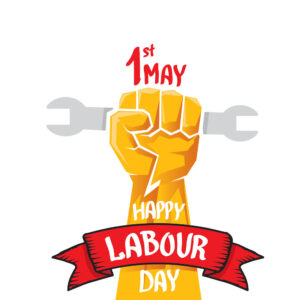World Labour Day

World Labour Day, also known as International Workers’ Day, is celebrated on May 1st every year to commemorate the achievements of the labour movement and to honor the contributions of workers worldwide. The day is a public holiday in many countries around the world.
The origins of World Labour Day can be traced back to the late 19th century, when workers in the United States and Europe began organizing themselves to demand better working conditions and higher wages. The first International Workers’ Day was celebrated on May 1st, 1890, to mark the anniversary of the Haymarket affair, a labor protest in Chicago that turned violent and led to the deaths of several workers.
Today, World Labour Day is a day of celebration and activism, with workers and labor unions organizing rallies, marches, and other events to highlight the importance of workers’ rights and to call for better working conditions, fair wages, and improved labor laws. The day is also an opportunity to recognize the contributions of workers to society and to reflect on the challenges that workers face in the modern economy.
Overall, World Labour Day is an important day for workers around the world, as it provides an opportunity to celebrate their achievements and to renew their commitment to the ongoing struggle for workers’ rights and social justice.
There are several laws in India that govern labor relations and protect the rights of workers. Here are some of the key laws for labor in India:
1. The Minimum Wages Act, 1948: This act ensures that workers are paid at least the minimum wage for their work, which is set by the government.
2. The Factories Act, 1948: This act regulates working conditions in factories, including safety, health, and welfare provisions for workers.
3. The Employees’ Provident Funds and Miscellaneous Provisions Act, 1952: This act establishes a provident fund for workers, which is a form of retirement savings.
4. The Payment of Bonus Act, 1965: This act requires employers to pay a bonus to workers based on their profits and the length of time they have worked for the company.
5. The Industrial Disputes Act, 1947: This act governs the resolution of disputes between employers and workers, including strikes and lockouts.
6. The Trade Unions Act, 1926: This act recognizes the right of workers to form and join trade unions, and establishes rules for the registration and functioning of trade unions.
7. The Maternity Benefit Act, 1961: This act provides maternity benefits to female workers, including paid leave and medical benefits during pregnancy and childbirth.
8. The Child Labour (Prohibition and Regulation) Act, 1986: This act prohibits the employment of children under the age of 14 in certain hazardous occupations and regulates their employment in other industries.
These are just a few examples of the laws that protect the rights of workers in India. The government continues to review and update labor laws to ensure that they remain relevant and effective in today’s changing economic and social conditions.
Labor is an important part of the world economy, and workers around the globe contribute to the growth and development of industries and economies. The labor force is diverse, and it includes people of all ages, genders, and nationalities, who work in a wide range of sectors, from agriculture and manufacturing to service industries.
While labor laws and standards vary from country to country, there are some international agreements and conventions that promote decent work and protect workers’ rights. For example, the International Labour Organization (ILO), a specialized agency of the United Nations, sets global labor standards and promotes social justice and decent working conditions for all workers.
However, despite these efforts, many workers around the world still face challenges and hardships, including low wages, poor working conditions, and inadequate social protection. Some workers are also subject to exploitation, discrimination, and forced labor.
In recent years, there has been growing awareness about these issues, and there have been efforts to improve labor conditions and promote workers’ rights around the world. For example, campaigns like the Fair Trade movement and the fight against modern slavery aim to raise awareness about labor issues and promote ethical and sustainable practices in industries.
Overall, labor is a crucial part of the global economy, and ensuring fair and decent working conditions for all workers is essential for promoting social and economic development around the world.




